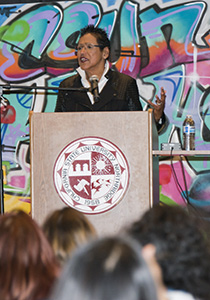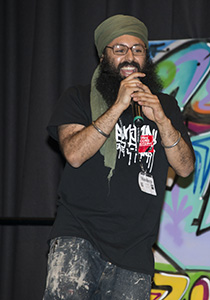CSUN’s Hip-Hop Conference Draws Hundreds
Hundreds of scholars, activists, students and performers gathered at California State University, Northridge for a two-day conference that examined hip-hop and how it connects people of color coping with incarceration and deportation.
The conference, held on Feb. 20 and 21 in the campus’ University Student Union, was titled “Bridging the Gaps: Hip Hop in the Age of Mass Incarceration and Deportation.”
The event included presentations by activist and former vice presidential candidate for the Green Party Rosa Clemente; Melina Abdullah, chair of the California State University, Los Angeles Department of Pan African Studies; activist and rapper Boots Riley of the group, The Coup; and Olmeca, an MC and activist who has garnered attention in the Latin Alternative scene. There were performances by spoken-word and local hip-hop artists.
The keynote speaker was author and former Black Panther Party leader Elaine Brown.
“We could never call ourselves free when other people were oppressed,” said Brown, reflecting on the philosophy of the Panther Party. The group was ahead of the times in collaborating with other “oppressed” people, including American Indians, Latinos, gays and lesbians, and the elderly, she said.
The power movements of the 1960s, including those led by black and brown people lost their fire over time but were reignited by hip-hop, Brown said.
“Into this void — the absence of a movement — comes hip-hop, spitting out the rage of the voiceless,” she said. “All we have left of a social, radical, progressive movement is the word, and the word is hip-hop.”
The conference was sponsored by CSUN’s Department of Pan African Studies and the Hip-Hop Think Tank, a student organization that facilitates academic analysis, research and critical discourse on hip-hop culture. This is the second hip-hop conference sponsored by the group.
“Hip-hop is the conduit that brings us all together,” said Anthony Ratcliff, a professor in the Department of Pan African Studies and advisor to the . “The issues around the mass incarceration of black people and the deportation of brown people is another issue that links us.”
“This conference provided a place for us to dialogue about the basic denial of human rights, utilizing hip-hop social activism as our primary language,” Ratcliff said. He said CSUN was the perfect place to host the event because it’s an academic environment that draws students from surrounding urban centers.



 experience
experience